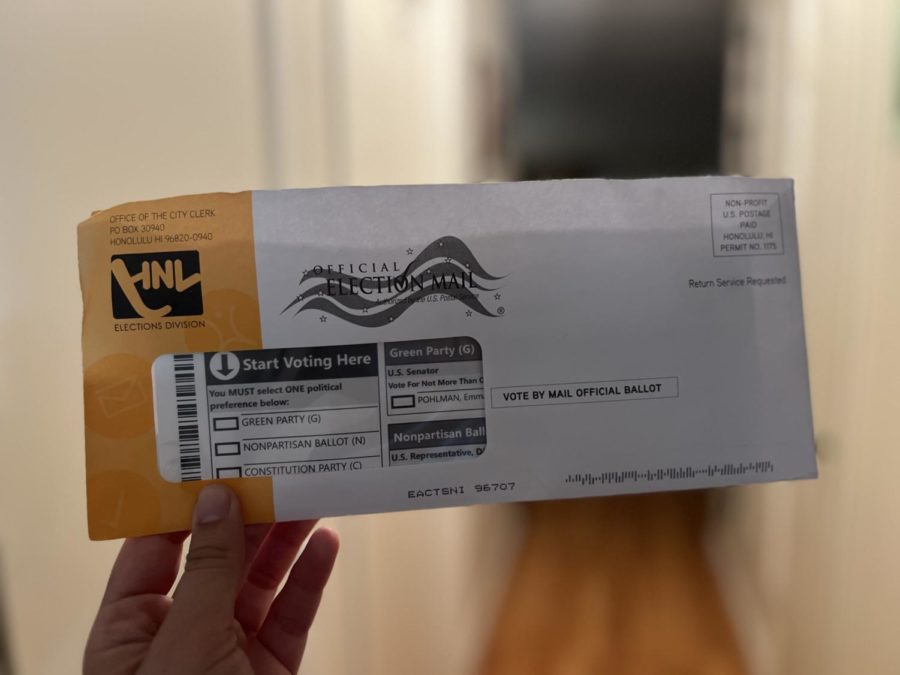Chaminade Students’ Thoughts on Midterm Election
With Election Day approaching, registered voters begin to vote as they receive their ballots through the mail.
On Tuesday, the midterm and general election allows Hawaii voters to cast their ballots for governor, one Senate seat, two House of Representatives seats, the state legislature, the OHA, and the ballot amendments. Chaminade students share their thoughts on where they stand with voting.
“I’m voting because I think it’s the right thing to do,” said Maria Bernaldez, a 21-year-old Environmental and Interior Design major. “I want certain things to change and what I believe would be the right course of action morally and ethically. I vote based on what I think is best for people.”
Bernaldez has voted in this year’s midterm election and the 2020 Presidential election. She says political issues such as immigration, abortion, and climate change are the three main issues that run through her mind. Her views on certain issues are strong and she is open-minded to anyone who is opposed but in the end, will stick to her values and beliefs until proven otherwise.
There are different reasons why people vote, from getting their voice heard or for a right, but for Noelani Tugaoen, a 19-year-old Communications major, her journey of voting is rooted from her parents but eventually became her own choice. Political issues such as abortion and locally, the railroad have motivated her to want her voice heard.
“When it comes to voting, it probably started with my parents,” Tugaoen said. “Growing up it was something that was important to them and now since I’m all about my culture, I want to do things that help protect culture but also preserve people’s necessities and rights.”
In 2016, Republican Donald Trump won the presidential election over Hillary Clinton. Many people, including Emma Asuncion, a 22-year-old Nursing student, believed that since then the views on the elections have become more urgent and people have begun to realize the importance of voting.
“I think the Trump campaign had a lot to do with why the election has become more prominent,” Asuncion said. “He rubbed off on people the wrong way, and many realized just how important the election is because for me it made me more interested and aware of politics.”
According to Bloomberg Government, in the 2018 midterm election, the age group 18-24 had the lowest percentage of voter turnout at 32.4%. Meanwhile, voters over the age of 65 had the highest voter turnout at 66.1%.
However, according to kff.org, in 2020 the voter turnout for ages 18-24 in Hawaii was higher at 44% but is still the lowest percentage against the 72% for the ages of 45-64.
Registered voters like student Tia Tabisola, a 22-year-old Nursing major who is born and raised on the island of Oahu, feels that she is uneducated enough to vote. Not knowing who she’d be voting for or what the candidates’ values are are the main reason she doesn’t vote.
“If we were more educated about the election and the candidates running, I would be more motivated to vote,” Tabisola said.
Around this time of year, multiple campaigns are posted on the side of the road holding up “vote for (candidate’s name)” signs to get drivers or pedestrians to take notice of who to vote for during the election. However, seeing a name on a poster doesn’t entail what the candidates are promoting or their stance on politics, says Asuncion.
However, there are students like Bernaldez who take that extra step to conduct in-depth research about each candidate. She takes the time to look up each candidate and their stance on certain political issues. By doing research, Bernaldez can get a better sense of their values and if candidates are just addressing the issue or if they have a plan to solve the issue because that determines if she’ll vote for them or not.
“A lot of people don’t realize that things happen because of political reasons and everything is politically driven; it would be nice for them to do their research,” Bernaldez said. “It doesn’t even have to be like hardcore research, but a little that from a credible source at least.”
Although many registered voters don’t vote, according to Pew Trust, the most prevalent reason is that people don’t care about politics and/or simply don’t want to vote. Unlike Tugaoen, she believed that a lot of people lost faith in the system and can understand why people would choose not to vote.
People believe that their vote won’t make a difference because it’s just one vote out of millions. Asuncion knows she should vote but at the same time won’t.
“I should vote because my voice matters and it’s my right but at the same time does my voice really matter because in my mind there’s such a small chance my vote would actually make a difference,” Asuncion said.
